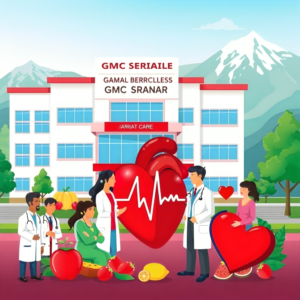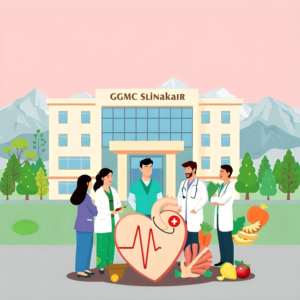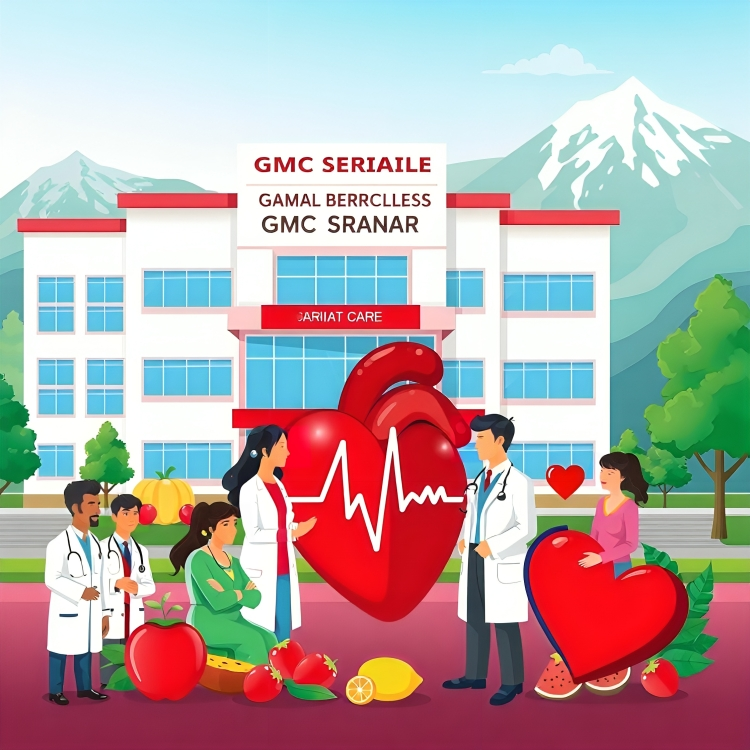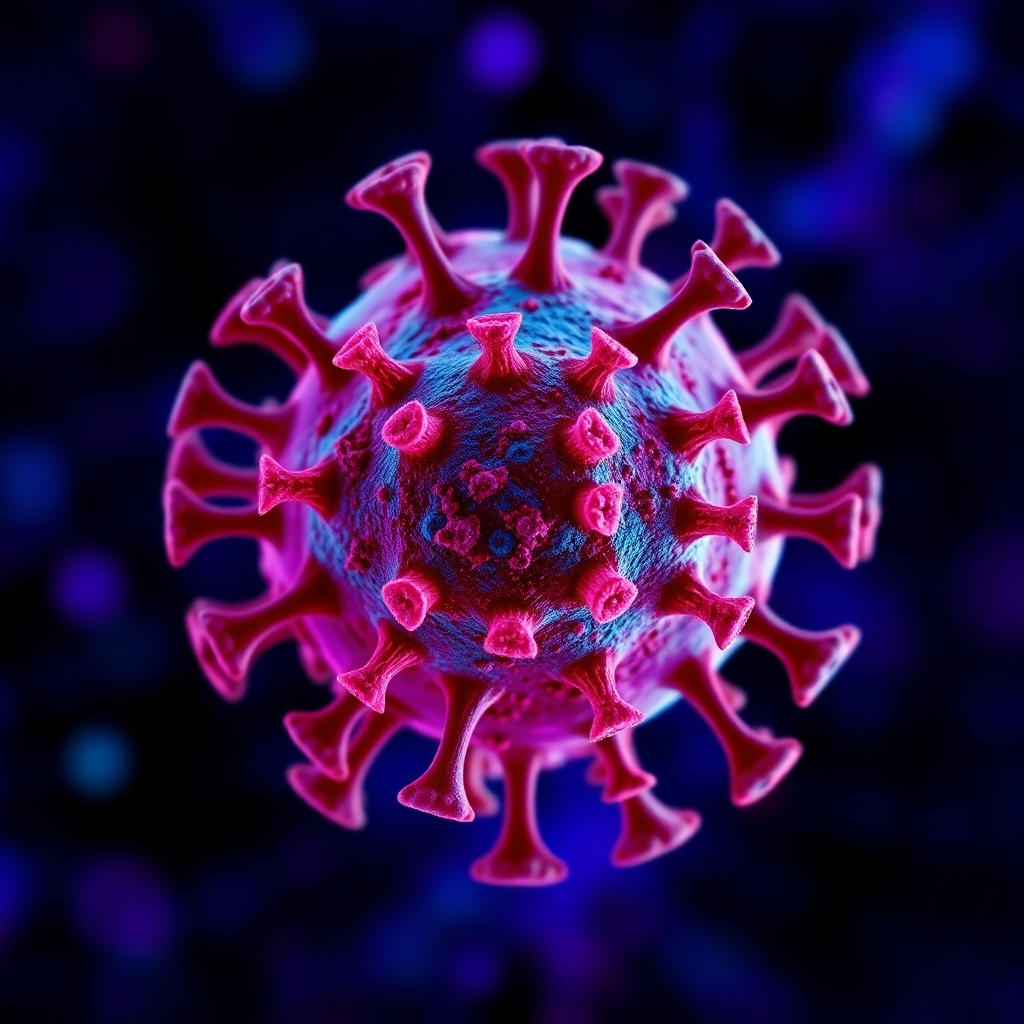Health
athletes and cardiac issues, bradycardia, cardiac arrhythmia, cardiac cough, cardiac failure, cardiac issues, cardiac output, cardiac sarcoidosis, cardiac sarcoidosis symptoms, cardiac screening, cardiac tamponade nursing, cardio revacularization, cardio vascular disease, carditis, dysrhythmia and cardiac arrest, fetal and congenital cardiac care, fetal cardiac assessment, fetal cardiac issues, health care (issue), pericarditis, prenatal cardiac diagnosis, tachycardia
prasadamit225566
2 Comments
GMC Srinagar urges precautions for people with cardiac issues

Introduction to GMC Srinagar and Its Cardiac Care Services
The Government Medical College, Srinagar, is a pillar of medical excellence in the region, providing exemplary health care services to the community. Among its wide array of medical specialties, cardiac care is particularly noteworthy. At a time when cardiovascular diseases are increasingly becoming prevalent, GMC Srinagar has established itself as a trusted institution for advanced cardiac treatments and compassionate patient care.
Heart disease is among the leading concerns across the globe and has never needed such elaborate, high-quality cardiac care as now. GMC Srinagar stands tall in answer to this challenge with technology at its forefront, alongside an experienced team of medical professionals working towards a patient-centric approach. Whether preventive care, emergency treatment, or rehabilitation, GMC Srinagar makes sure all patients receive individualized care to achieve optimal heart health.
Having aimed for the betterment of heart-diseased patients, GMC Srinagar continues to make new advancements and expand their cardiac care services. Providing novel medical interventions, the establishment is also involved in various community outreach and education endeavors, in an effort to increase knowledge related to heart health.
The Relevance of Cardiac Health Awareness Awareness of Significance of Cardiac Health

The heart is this really amazing organ that continually functions to maintain life in one’s body. Though it does its work, it is still underrated until something goes wrong. Having knowledge about cardiac health plays an important role in avoiding diseases, early detection, and proper management of illnesses. Heart health knowledge thus gives people the power to make informed decisions that reduce the risk of cardiovascular disease considerably.
One of the fundamental elements of cardiac health awareness is the knowledge of risk factors. Lifestyle factors such as an unhealthy diet, lack of physical activity, smoking, and excessive alcohol consumption are the major contributing factors to heart disease. Another factor is genetic predisposition and coexisting conditions such as diabetes, obesity, and hypertension. Such awareness helps individuals take precautionary measures and seek early medical advice.
Equally important is the recognition of heart problems’ warning signs. Symptoms such as chest discomfort, shortness of breath, fatigue, dizziness, and irregular heartbeats should never be ignored. Public education campaigns and community outreach programs by institutions like GMC Srinagar help disseminate this vital information, potentially saving countless lives.
Heart health is not an individual responsibility; it’s the collective responsibility. If more people participate in the awareness and education programs and help spread right information, then a culture can be promoted where the cardiac health would be encouraged and taken care of.
Precautions for People with Heart Problem Management of Cardiac Disease

A long-term journey of managing heart conditions for patients with proper medical guidance, lifestyle adjustment, and personal commitment is always crucial to the management of a heart patient by GMC Srinagar’s experts, who consider compliance with recommended protocols necessary to maintain heart health and avoid complications.
Medication Adherence: Prescribed medications are part of managing heart conditions. Patients need to take their prescribed medications as directed for the purpose and side effects. Consistent drug adherence will advance outcomes greatly.
A heart-healthy diet is one of the cornerstones of cardiac care. A well-balanced diet with plenty of fruits, vegetables, whole grains, and lean proteins and less saturated fats, trans fats, and sodium can reduce the risk of further complications. Consulting a nutritionist can provide tailored dietary plans for individual needs.
Physical Activity: The heart becomes stronger and improves the general cardiovascular health by regular exercise. Walking, swimming, and cycling are a few of the activities. Patients should consult their health care provider to determine the intensity and type of exercise suitable for their condition.
Routine Check-Ups: Regular medical check-ups ensure that the heart condition can be monitored and adjusted to prevent untimely changes in the state of health.
Stress Management: Chronic stress affects the well-being of the heart. Stress-reducing measures such as meditation, yoga, and deep breathing exercise can help ease the stress on the cardiovascular system.
It also avoids unhealthy habits such as smoking and excessive alcohol intake, both of which are leading risk factors for heart disease. Smoking and excess alcohol consumption will help quit not only the heart health but the overall well-being too.
Weight Management: Maintaining a healthy weight reduces strain on the heart and further lowers the chances of developing complications. Healthy diet coupled with regular exercise can assist in achieving it.
It helps ensure quality sleep at the amount needed for the health of the heart. Lousy sleeping patterns contribute to an increase risk in diseases related to heart complications. A good night sleep for any patient should be about 7-9 hours in total.
Adopting such precautionary measures allows cardiac patients to enjoy healthy, fulfilling lives. The GMC Srinagar’s cardiologists and the other staff are committed to support in every step for a patient.
Recommendations for Managing Cardiac Health During Challenging Times

Adapting Cardiac Care Routines in Time of Crisis
Life is filled with uncertainties—be it in terms of a global pandemic, natural disaster, or other personal challenges. All this may cause a shift from one’s routine, especially if the person suffers from a cardiac condition. Their heart health needs adaptability and resilience during these phases. GMC Srinagar’s approach to crisis management ensures continuity of care.
Telemedicine and Remote Consultations: No restricted mobility during crisis situations should compromise care. GMC Srinagar’s telemedicine services have developed a platform so that patients can consult with specialists from the safety and comfort of their homes. This ensures timely medical advice and follow-ups.
Emergency Planning: Heart conditions should be prepared with emergency planning. This may involve a current medication list, maintaining healthcare provider contact information, and awareness of the nearest emergency facilities.
Emotional Support: The state of being stressed or anxious about challenging times could lead to an increase in heart conditions. Seeking emotional well-being through mental health experts or other relaxation methods is crucial.
Even if it is not possible to venture out, one can be physically active by working out from home. Guided videos, virtual fitness classes, and even stretching routines can keep the heart moving.
Nutrition and Hydration: Stocking healthy, non-perishable food items ensures adherence to a heart-healthy diet even when fresh produce is not readily available. The same goes for staying hydrated.
Monitoring regularly: Patients should monitor their symptoms and vital signs, such as blood pressure and heart rate, to detect any changes. Home monitoring devices can be a great investment.
Community support: Support networks, whether family, friends, or patient groups, provide emotional and practical assistance during difficult times.
Vaccinations and preventive care: Ensuring vaccinations, such as flu shots, can prevent additional health complications that might strain the heart.
During a crisis, flexibility is what one needs. With proper planning and support, patients suffering from cardiac disorders can easily manage a crisis without having to risk their health. The care provided at GMC Srinagar includes all types of guidance necessary for individual patients.
Partnership Between Healthcare Professionals and Patients
Creating a Partnership in Cardiac Care
Good cardiovascular care is not just a provider endeavor; it thrives on collaboration between healthcare providers and patients. This partnership helps to build trust, communicate with each other, and share commitment toward optimal care.
Clear Communication: Patients should feel comfortable discussing their symptoms, concerns, and lifestyle challenges with their healthcare providers. Open communication ensures that treatment plans are personalized to individual circumstances.
Educational Activities: GMC Srinagar conducts workshops and seminars to educate patients regarding their conditions, treatment options, and lifestyle changes. Knowledge is a powerful tool that empowers patients to take an active role in their care.
Shared Decision-Making: Treatment plans are most effective when developed collaboratively. Healthcare providers at GMC Srinagar work closely with patients to set realistic goals and overcome potential obstacles.
Follow-Up Care: Regular follow-ups are very important for monitoring progress and adjusting treatment plans. GMC Srinagar’s system ensures that patients remain engaged in their care.
Support Networks: Building connections with other patients through support groups can provide motivation, encouragement, and practical advice. GMC Srinagar facilitates these interactions to foster a sense of community.
Feedback Mechanisms: Encouraging patients to provide feedback helps healthcare providers improve their services and address any gaps in care.
By working in tandem, patients and providers can create a supportive environment that promotes lasting heart health. This is the power of teamwork, which GMC Srinagar’s model of collaborative care exemplifies.
Resources and Support for Cardiac Patients at GMC Srinagar
Getting Specialized Care and Services
GMC Srinagar is well-stocked with a wide array of resources to cater to the various needs of cardiac patients. From the latest diagnostics to specialized treatments, the services offered by the institution are designed to provide holistic care.
Advanced Diagnostics: Accurate diagnosis is the foundation of effective treatment. GMC Srinagar offers cutting-edge diagnostic tools such as echocardiograms, stress tests, and cardiac catheterization to evaluate heart health.
Expert Team: The cardiologists, cardiac surgeons, and specialized nurses who make up the team in the institution are leaders in their fields. They ensure that the highest standard of care is offered to the patients.
Rehabilitation Programs: Cardiac rehabilitation is a recovery program designed for patients after procedures like angioplasty or bypass surgery. The programs are aimed at exercising under supervision, nutritional counseling, and psychological support.
Community Outreach: GMC Srinagar organizes health camps and awareness drives to extend its services to underserved areas. These initiatives ensure that quality care is accessible to all.
Emergency Services: The institution’s 24/7 emergency care unit is equipped to handle critical cardiac cases, providing immediate attention to patients in need.
Patient Education: Educational materials, workshops, and counseling sessions help patients understand their conditions and make informed decisions about their care.
Support Groups: GMC Srinagar provides support groups for patients, which enables them to share experiences, exchange tips, and build camaraderie.
By utilizing these resources, GMC Srinagar ensures that every cardiac patient receives personalized, compassionate, and effective care.
Addressing Common Misconceptions About Cardiac Care
Clarifying Myths Surrounding Cardiac Health
Misconcepts about heart health can pose a hindrance to preventive measures, diagnosis, and treatment efforts. The GMC Srinagar’s attempts to dispel these misgivings contribute greatly to an enlightened and responsible society.
Myth : Heart Disease is for seniors
Reality: Heart ailments can occur at any stage of life. Badly chosen lifestyles and genetic diseases can lead to heart ailment in even the very young.
Myth : Chest pain is the main symptom of a heart attack
Fact: Heart attacks can present with diverse symptoms, including jaw pain, nausea, fatigue, and shortness of breath. Awareness of these signs is crucial.
Myth: Exercise Is Dangerous for Heart Patients
Fact: Regular physical activity, when guided by a healthcare provider, is beneficial and often recommended for individuals with heart conditions.
Myth: Heart Disease Is Inevitable If It Runs in the Family
Fact: While genetic predisposition increases risk, adopting a healthy lifestyle can significantly mitigate this risk.
Myth: Medications Alone Can Cure Heart Disease
Fact: Medications are an important part of treatment but must be combined with lifestyle changes and regular medical supervision.
By addressing these myths, GMC Srinagar helps individuals take a proactive and realistic approach to their heart health.
Conclusion: Empowering Individuals to Prioritize Their Cardiac Health
Encouraging Proactive Steps for Heart Health
Heart health is a shared responsibility that requires individual commitment and institutional support. GMC Srinagar’s dedication to cardiac care inspires individuals to take charge of their health through preventive measures, lifestyle changes, and collaboration with medical experts.
Every small step counts. Selecting a healthy diet, regular exercise, control of stress, and regular check-up are all actions that add to a healthier heart. GMC Srinagar’s comprehensive care would ensure that people are being provided with the tools and resources and guidance in every way to take their hearts in the right direction.
Let’s embrace a future where heart health is a priority for all. With GMC Srinagar as a trusted partner, individuals can achieve and maintain optimal cardiovascular well-being, paving the way for a healthier, happier life.


















2 comments